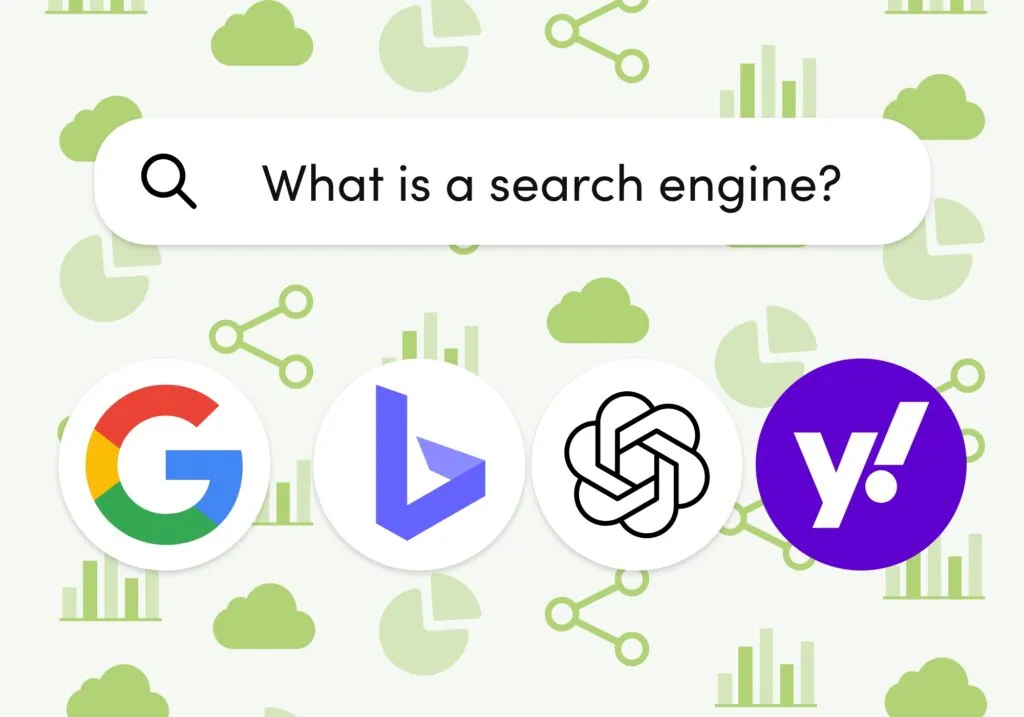Search engine algorithms are a key component to unlocking your business’ digital potential, guiding customers to your online doorstep in a competitive online marketplace.
These algorithms are so important in digital marketing, determining how easily potential clients discover your services.
By understanding search engine algorithms, you can enhance your website’s visibility, attract more visitors, and drive growth.
The good news is, we’re going to break down these complex systems, sharing our insights into the inner workings of Google and its competitors.
Table of Contents
ToggleThe TL;DR (too long, didn't read) 👇
- Search engines act as digital librarians. Google, Bing, Yahoo, and newcomers like SearchGPT use unique algorithms to deliver relevant results based on user queries and additional data like location and device.
- Search engines follow a three-step process: crawling (discovering content), indexing (organising and storing data), and ranking (prioritising results based on relevance and quality).
- Success in search rankings relies on strategically using keywords, creating high-quality content, optimising user experience, and building authoritative backlinks.
- Google is constantly changing. Major Google updates, such as Panda, Penguin, and BERT, have made the search engine require better content quality, ethical link-building, and user intent and highlighted the need for mobile optimisation and valuable content.
- Keep up with algorithm changes by following industry leaders, using SEO tools, and continuously adapting strategies to maintain and improve your online presence. Excite Media offers expertise to help businesses navigate this dynamic landscape.

What are search engines? 🔎
A brief history 📚
The search engine story began in the early 1990s with pioneers like Archie and Gopher, which helped users locate files online. The late ’90s saw the emergence of AltaVista, offering natural language search capabilities. However, it was Google, with its PageRank algorithm in 1998, that revolutionised how we access information online, setting the stage for the search engines we know today.
The big players
Nowadays, Google reigns supreme, handling around 8.5 billion searches per day. Despite dominating the market, other contenders like Bing and Yahoo continue to innovate, offering unique features and search experiences. Each search engine employs its unique algorithms to sift through billions of web pages, ensuring users find the most accurate and relevant results.
More recently, with the rise of Large Language Models, OpenAI – the owners of ChatGPT – has entered the market, launching a search engine called SearchGPT. This is the latest competitor in the market, and the first in a number of years to make a sizeable dent into the industry’s market share.
Why it matters
Understanding search engines is essential for businesses aiming to enhance their online visibility. Google can be a huge source of revenue for a lot of businesses.
At Excite Media, we specialise in guiding you through this complex world of SEO, ensuring your business reaches its audience effectively with tailored strategies and insights.
This is exactly what our SEO product has been designed for.
We use a strategic approach that not only makes the information on a website easily digestible but – more importantly – keeps the content engaging and useful for readers looking to understand and leverage search engines for their business.

How search engines work 🪄
No one knows exactly how search engines work, but we can take a very educated guess. Some SEO experts believe there are over 200 components that make up an algorithm, such as Google’s. We have simplified it to three core components that every website is subject to before appearing on a search engine results page (SERP).
Step 1: Crawling — The Discovery Phase
What is crawling?
- The initial step in the search engine process.
- It involves digital bots, known as crawlers or spiders, exploring the web.
How crawling works
- Crawlers visit web pages and follow links to discover content.
- They regularly revisit sites to detect changes or new additions.
- Well-structured sites and submitted sitemaps aid efficient crawling.
Why is crawling important for your business?
- The initial step in the search engine process.
- It involves digital bots, known as crawlers or spiders, exploring the web.
Step 2: Indexing — The Organisation Phase
What is indexing?
- It is the process following crawling.
- It involves organising and storing the data collected by crawlers.
How indexing works
- Search engines analyse content from crawled pages for relevance and quality.
- Information is categorised and stored in vast databases.
- Indexed data allows search engines to quickly retrieve relevant results for user queries.
Why is indexing important for your business?
- Proper indexing ensures your website content is accessible in search results.
- Well-organised content increases the likelihood of higher search rankings.
Step 3: Ranking — The Prioritisation Phase
What is ranking?
- The process of determining the order of search results.
- Essential for delivering the most relevant content to users.
Why is ranking important for your business?
- Higher rankings increase visibility and drive more traffic to your site.
- Being on the first page of search results significantly boosts click-through rates.
Enhancing your business' ranking
- Optimising these factors can improve your site's position in search results.
- We'll look into the key components that affect rankings in the next section.
We know how important this process is. We help businesses improve search visibility as part of our digital marketing strategies.

So, how do search engine algorithms work? 💪
Search engine algorithms use a complex set of rules to decide which web pages deserve the spotlight when you type in a query.
Imagine a chef with a secret recipe that decides which dishes make it to the top of the menu. In the world of search engines, algorithms are like that chef.
These algorithms are the backbone of search engines, working behind the scenes to ensure you get the most relevant and useful results.
How do algorithms determine relevance and ranking?
What happens when you perform a search? 🖥️
When you type a query into a search engine, you’re initiating a complex process designed to deliver the most relevant information quickly. Here’s a glimpse into what happens behind the scenes:
- The search engine starts by analysing your query to understand its intent and context. This involves breaking down the query into keywords and phrases that help determine what you’re looking for.
- The search engine then scours its vast index to identify pages that match your query. This involves filtering through billions of web pages to find the most relevant results.
- Using sophisticated algorithms, the search engine ranks these relevant pages. Each search engine has its unique algorithm that considers factors such as content relevance, quality, and user experience to determine the order of results.
- Beyond the query itself, search engines utilise other data to refine the results:
- Location: If your search has local intent, like "cafes near me," the search engine uses your geographic location to tailor the results.
- Language: The search engine attempts to detect your language preference and returns results accordingly.
- Search history: Your previous searches can influence the results, providing more personalised outcomes.
- Device: The type of device you're using—whether a desktop, tablet, or mobile—can affect the results, optimising them for the best user experience on that device.
By understanding these processes, you can better appreciate how search engines deliver tailored and relevant information.
The key components to ranking in search engines
Keywords: The building blocks 🧱
Keywords are essential for helping search engines understand the focus of your content. They are the first thing we research at Excite Media when we take on a new SEO client.
By strategically placing relevant keywords throughout your site, you signal to search engines that your content matches user queries.
It’s important to use keywords naturally and contextually to avoid penalties for keyword stuffing, ensuring your page remains relevant and discoverable. You don’t always need to use the exact words that you’re trying to rank for if they don’t read naturally.
Quality content ✏️
Quality content is so important for engaging visitors and keeping them on your site. Search engines prioritise content that is valuable, original, and informative.
Content should be produced primarily to answer the questions of the reader quickly and concisely. Consistently producing fresh and engaging content should not only satisfy your audience but also help improve your rankings. Search engines favour pages that provide helpful, yet engaging, information.
If you’re not sure where to start, make sure you check out our blog about quality content.
User experience
Backlinks 🔗
Backlinks serve as endorsements from other websites, signalling to search engines that your content is trustworthy and authoritative.
High-quality backlinks from reputable sites enhance your credibility and ranking. Building a robust backlink profile involves earning links through genuine relationships and valuable content, rather than relying on outdated link-building tactics.
Some businesses naturally gain links to their website from other websites by being an established authority within their industry. Others, however, will likely find that a Digital PR strategy is the best way to earn backlinks from media publications relevant to their industry.
Knowing how the algorithms work sets you up for success 🏆

Search engines are updating their algorithms all the time
Here are Google's major algorithm updates 🐧
- Panda (2011): Reduced the visibility of low-quality content, promoting the creation of valuable and engaging material.
- Penguin (2012): Addressed unethical link-building tactics, reinforcing the importance of earning natural backlinks.
- Hummingbird (2013): Enhanced search intent understanding, making content relevance and natural language crucial.
- Pigeon (2014): Boosted local search results by integrating web ranking signals, improving local business visibility.
- 2015 Mobile Update: Prioritised mobile-friendly sites, making responsive design essential for maintaining search rankings.
- 2018 Mobile Page Speed Update: Made page speed a ranking factor for mobile searches, pushing for faster-loading websites.
- BERT (2019): Revolutionised search with better natural language processing, providing more relevant results.
- 2023 and 2024 Helpful Content Updates: Emphasised the creation of genuinely valuable content, penalising content made solely for ranking purposes.
Our specialists at Excite Media keep up to date with SEO news every day and are always ready to react to the consistently evolving world of SEO.
However, the most important thing is to do an excellent job of the key components of the search algorithm that we learned in the previous section. If you do your keyword research well, back it up with quality content, have a fast, optimised website and have a healthy backlink profile, your website should be safe from negative results in an algorithm update.
The Google API Leak: Insights and implications 🚰
Summary of the Google API Leak
Recently, the SEO community was able to take its closest look at what makes Google’s algorithm work the way it does with a leak of its Google API (Application Programming Interfaces). A source released thousands of internal Google search API documents, providing an unprecedented glimpse into the inner workings of Google’s ranking systems and ranking factors. This leak sparked widespread discussion and analysis among SEO professionals and digital marketers.
Key revelations from the leaked documents
The leaked documents revealed several intriguing insights into Google’s search operations:
- Ranking signals: The documents highlighted a detailed breakdown of ranking signals that Google uses to evaluate and rank web pages. While many of these factors were already known, the leak offered more precise insights into their weighting and influence.
- Algorithm updates: There was evidence of how certain algorithm updates have been implemented, providing clarity on changes that have historically impacted search rankings.
- Search personalisation: The documents underscored the extent to which Google personalises search results based on user behaviour, location, and search history, confirming suspicions about the depth of personalisation.
- Content freshness: The importance of content freshness was emphasised, showing how frequently updated content can positively impact rankings, particularly for time-sensitive topics.
- Mobile optimisation: The leak reinforced the priority Google places on mobile optimisation, highlighting the continued importance of mobile-friendly websites in ranking considerations.
- User engagement metrics: Documents revealed Google's focus on user engagement metrics such as click-through rates and dwell time, further illustrating the importance of creating engaging and relevant content.

Here's how you can keep up with algorithm changes
Stay informed 📕
- Follow Industry Leaders: Keep up with insights from SEO experts and thought leaders who often share valuable updates and analyses on platforms like X (Twitter) and LinkedIn. If you hire us at Excite Media, feel free to chat with our team about what's new in the industry, we're always happy to share what we know.
- Subscribe to SEO newsletters: Regularly read newsletters from reputable sources such as Search Engine Journal or Search Engine Roundtable, which provide timely information on algorithm changes.
Use resources and tools ⚒️
- Google Search Central Blog: Monitor this official Google blog for announcements and explanations about updates directly from the source.
- SEO Tools: Utilise tools like Ahrefs, SEMrush, or Moz, as well as Google’s own tools, Google Search Console & Google Analytics 4, to track your website's performance and detect any changes that might indicate an algorithm update.
Keep learning 🍎
- Use online resources or attend in person events: There are plenty of resources online that can help you learn basic and advanced SEO. There are also many groups around the world for SEOs to meet up and discuss the industry.
- Adapt and experiment: Continuously test new strategies and adapt to changes, as SEO is an evolving field that rewards innovation and flexibility.
Need a hand with your SEO? We'd love to help 👋
Book a chat with our team to find out how we can help you outsmart the search engine algorithms and climb the Google rankings.




